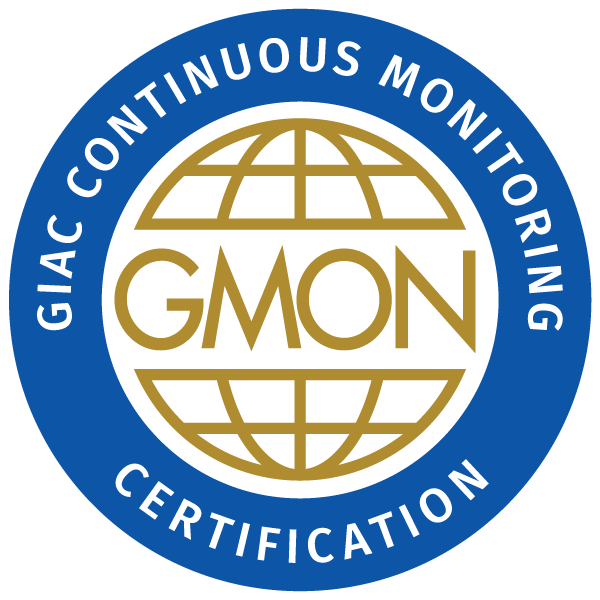Areas Covered
- Security architecture and security operations centers (SOCs)
- Network security architecture and monitoring
- Endpoint security architecture, automation, and continuous monitoring
Who is GMON for?
- Individuals working to implement continuous diagnostics and mitigation, continuous security monitoring, or network security monitoring
- Security architects
- Senior security engineers
- Technical security managers
- SOC analysts, engineers, and managers
- CND Analysts
GMON with CyberLive
GIAC knows that cyber security professionals need:
- Discipline-specific certifications
- Practical testing that validates their knowledge and hands-on skills
In response to this industry-wide need, GIAC developed CyberLive - hands-on, real-world practical testing. CyberLive testing creates a lab environment where cyber practitioners prove their knowledge, understanding, and skill using:
- Actual programs
- Actual code
- Virtual machines
Candidates are asked practical questions that require performance of real-world-like tasks that mimic specialized job roles.
Exam Format
- 1 proctored exam
- 82 questions
- 3 hours
- Minimum passing score of 74%
Delivery
NOTE: All GIAC Certification exams are web-based and required to be proctored. There are two proctoring options: remote proctoring through ProctorU, and onsite proctoring through PearsonVUE. Click here for more information.
GIAC certification attempts will be activated in your GIAC account after your application has been approved and according to the terms of your purchase. Details on delivery will be provided along with your registration confirmation upon payment. You will receive an email notification when your certification attempt has been activated in your account. You will have 120 days from the date of activation to complete your certification attempt.
Exam Certification Objectives & Outcome Statements
- Account & Privilege Monitoring & Authentication The candidate will demonstrate the ability to control the privilege levels of accounts & applications
- Attack Techniques The candidate will learn to distinguish between traditional and modern attack techniques
- Configuration Monitoring The candidate will demonstrate an understanding of the tool and techniques used for configuration change monitoring
- Cyber Defense Principles The candidate will demonstrate an understanding of traditional and modern cyber defense principles
- Device Monitoring The candidate will demonstrate an understanding of the tool and techniques used for endpoint monitoring
- Discovery and Vulnerability Scanning The candidate will demonstrate an understanding of the tools and techniques used for network and endpoint discovery and vulnerability scanning
- Exploit Methodology and Analysis The candidate will be able to utilize network traffic analysis methods and principles of exploit detection to be able to rapidly discover intrusions on the network
- HIDS/HIPS/Endpoint Firewalls The candidate will demonstrate an understanding of how host intrusion detection/prevention systems & endpoint firewalls work, what their capabilities are and the roles they play in continuous monitoring
- Network Data Encryption The candidate will be able to apply principles of exploit detection to be able to rapidly detect encrypted intrusions on the network
- Network Security Monitoring Tools The candidate will demonstrate an understanding of how and why to use an assortment of network monitoring tools to improve the ability to detect intrusions on the network
- NIDS/NIPS/NGFW The candidate will demonstrate an understanding of how network intrusion detection/prevention systems & next generation firewalls work, what their capabilities are and the roles they play in continuous monitoring
- Patching & Secure Baseline Configurations The candidate will understand how to use baseline configuration auditing and patching to make endpoints more resilient.
- Perimeter Protection Devices The candidate will demonstrate the ability to identify points of access into the perimeter and network devices that can be used to protect the perimeter
- Proxies & SIEM The candidate will demonstrate an understanding of how proxies & security information and event managers work, what their capabilities are and the roles they play in continuous monitoring
- Security Architecture Overview The candidate will demonstrate an understanding of traditional and modern security architecture frameworks and the role Security Operations centers provide
- Software Inventories and Application Control The candidate will demonstrate an understanding of the benefits of maintaining software inventories and how to control application allow and deny lists.
- Threat Informed Defense The candidate will demonstrate an understanding of adversary tactics and techniques and how to use attack frameworks to identify and defend against these threats in local and cloud-based environments.
Other Resources
- Training is available in a variety of modalities including live training and OnDemand
- Practical work experience can help ensure that you have mastered the skills necessary for certification
- College level courses or self paced study through another program or materials may meet the needs for mastery.
- Get information about the procedure to contest exam results.
Practice Tests
- These tests are a simulation of the real exam allowing you to become familiar with the test engine and style of questions.
- Practice exams are a gauge to determine if your preparation methods are sufficient.
- The practice bank questions are limited so you may encounter the same question on practice tests when multiple practice tests are purchased.
- Practice exams never include actual exam questions.
- Purchase a GMON practice test here.
- GIAC recommends leveraging additional study methods for test preparation.



